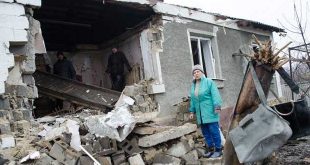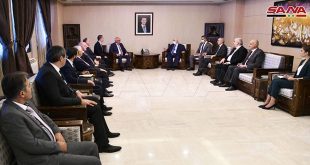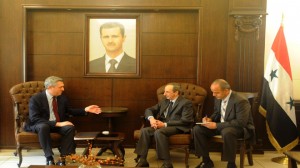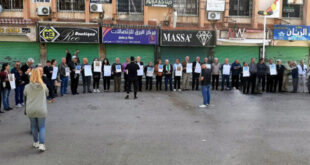Damascus, SANA – Deputy Prime Minister, Foreign and Expatriates Minister Walid l-Moallem reiterated the Syrian government’s commitment to securing livelihood needs to its people and the refugees alike.
Speaking to UN High Commissioner for Refugees (UNHCR) Filippo Grandi during a meeting on Thursday, al-Moallem said the government is cooperating with the United Nations and organizations that are “serious” about providing humanitarian help, noting that these efforts are being coordinated with the Syrian Arab Red Crescent (SARC).
It is necessary, he added, that providing aid not be politicized in service of special political agendas far from the humanitarian purpose, an issue that would cause the refugees’ conditions to deteriorate.
Grandi, for his part, said the UNHCR is aware of the difficulties standing in the way of carrying out its missions and is working to balance refugee issues and gaps between the resources available and the humanitarian needs required.
The UNHCR, the Commissioner added, appreciates the standing cooperation with the Syrian government in the field of providing assistance to refugees and displaced people in light of their increasing numbers and aggravated living conditions.
The UN agency is ready to continue this cooperation, said Grandi.
Grandi and Deputy Foreign and Expatriates Minister Fayssal Mikdad met earlier today and discussed the bilateral relations between Syria and the UNHCR, with Mikdad expressing satisfaction over the mutual cooperation.
Later on the day, Deputy Prime Minister for Services Affairs, Minister of Local Administration Omar
Ghalawanji met with Filippo Grandi and affirmed to him that the Syrian government is keen on delivering relief and humanitarian aid to beneficiaries constantly and regularly and at the right time.
The Committee, its branches and local and international partners work on carrying out the delivery process despite various difficulties and hindrances facing their work, added Ghalawanji, who is the Head of the Higher Committee for Relief.
A recent example of these difficulties was two days ago when terrorist organizations prevented relief teams from entering the besieged towns of Kefraya and al-Fouaa in Idleb to deliver aid at the same time when aid was making its way al-Abadan city and Madaya town in Damascus Countryside.
Besides this example mentioned by Ghalawanji, he also briefed Grandi on the siege which ISIS terrorist organization imposes on tens of thousands of the residents of Deir Ezzor in eastern Syria who are under the risk of starvation.
In spite of all the terrorist practices, the government takes all necessary measures to ensure delivery of humanitarian aid to beneficiaries, said the Relief Committee’s Head.
He also noted that the government works for returning displaced people to their home areas from which terrorist organizations were expelled, citing over 1.7 million people who returned to their homes, in addition to 2000 displaced people staying at makeshift centers in Lattakia who recently returned to their towns in the countryside of Aleppo.
Only yesterday, Ghalawanji added, over 5000 displaced people returned back to al-Qadam area in Damascus in the framework of a reconciliation achieved in the southern parts of Damascus city.
The government’s efforts to rehabilitate damaged infrastructure and public services facilities were highlighted by Ghalawanji, who thanked the UNHCR for its role in supporting these efforts and those of the Relief Committee in relation to securing makeshift centers since the first humanitarian response plan of 2012.
The UN official, who took over as the 11th head of the UNHCR on 1 January 2016, said his visit to Syria is important in terms of having the opportunity to get acquainted with the humanitarian efforts of the UN and its partners on the ground.
It is necessary, he added, that partnership and dialogue with the Syrian government continue as they will lead to progress and improved joint performance in the relief field.
H. Said
 Syrian Arab News Agency S A N A
Syrian Arab News Agency S A N A





